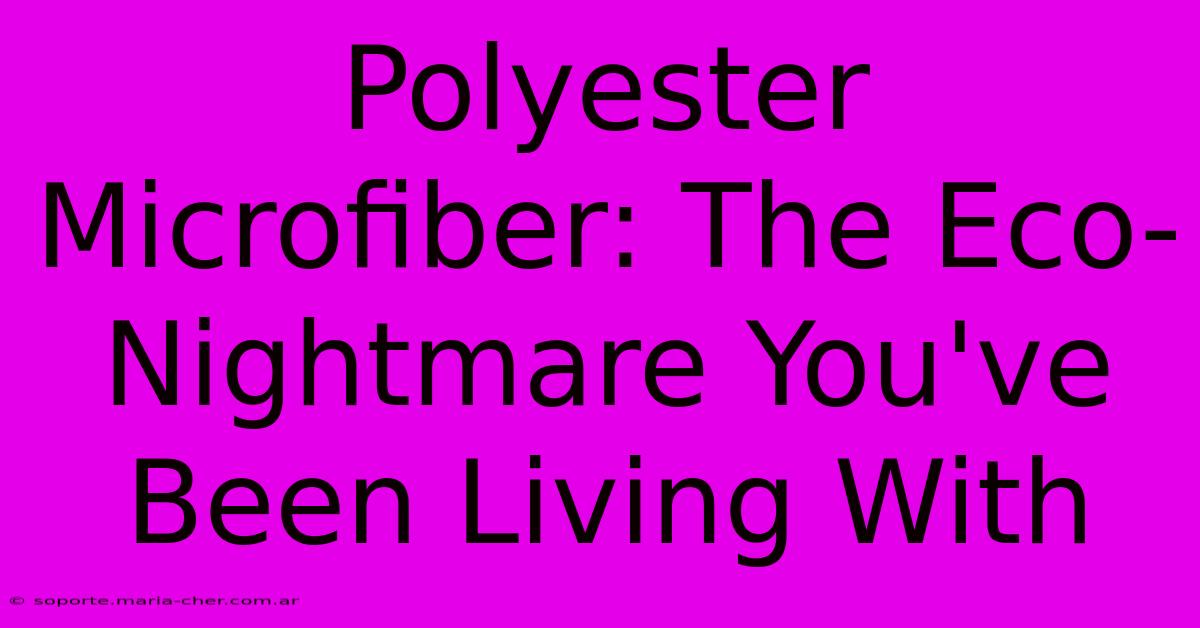Polyester Microfiber: The Eco-Nightmare You've Been Living With

Table of Contents
Polyester Microfiber: The Eco-Nightmare You've Been Living With
We love our soft, fluffy microfiber towels and clothes. They're inexpensive, readily available, and incredibly absorbent. But what if I told you that this seemingly innocuous fabric is contributing to a significant environmental crisis? Polyester microfiber, a ubiquitous material in our daily lives, is quietly wreaking havoc on our planet, and it's time we understood the extent of the problem.
The Hidden Environmental Impact of Polyester Microfiber
Polyester microfiber is a synthetic fabric made from petroleum-based plastics. This inherently unsustainable production process contributes to:
-
Greenhouse Gas Emissions: The manufacturing of polyester releases significant amounts of greenhouse gases, exacerbating climate change. From the extraction of oil to the complex chemical processes involved, the carbon footprint is substantial.
-
Microplastic Pollution: The biggest concern surrounding polyester microfiber is its contribution to microplastic pollution. These tiny fibers shed from clothing and textiles during washing and end up in our waterways, ultimately entering our oceans. This microplastic pollution poses a severe threat to marine life and potentially human health. Fish ingest these particles, and the particles can work their way up the food chain.
-
Water Pollution: The dyeing and finishing processes involved in polyester production often release harmful chemicals into water sources, contaminating rivers and oceans. These chemicals can harm aquatic life and disrupt delicate ecosystems.
-
Non-Biodegradable Nature: Unlike natural fibers like cotton or linen, polyester microfiber does not biodegrade. It persists in the environment for hundreds, even thousands, of years, accumulating in landfills and polluting our oceans.
The Shedding Problem: A Never-Ending Cycle of Pollution
The very nature of microfiber makes it a perpetual polluter. Every time you wash a polyester garment or towel, countless microscopic fibers shed and are flushed down the drain. Conventional washing machines aren't equipped to effectively filter these tiny particles, meaning they escape into wastewater treatment plants and often bypass filtration systems.
What you can do to mitigate the problem:
-
Guarding against Microfiber Pollution: Use a Guppyfriend washing bag to trap shed microfibers during laundry. This simple step significantly reduces the amount of plastic entering our waterways.
-
Washing Machine Filters: Consider investing in a washing machine filter designed specifically to capture microplastics.
Alternatives to Polyester Microfiber: Choosing Sustainable Fabrics
The good news is that there are alternatives to polyester microfiber. Consider switching to more sustainable fabrics such as:
-
Organic Cotton: A natural, renewable resource that requires fewer pesticides and less water than conventional cotton.
-
Bamboo: A rapidly renewable resource that requires minimal pesticides and water. It is also naturally antibacterial and hypoallergenic.
-
Hemp: A durable and sustainable fabric that requires little water and no pesticides.
-
Tencel (Lyocell): Made from sustainably sourced wood pulp, Tencel is a biodegradable and incredibly soft fabric.
Taking Responsibility: The Path to a Cleaner Future
The issue of polyester microfiber pollution is a complex one, but we all have a role to play in mitigating its impact. By being mindful of our clothing choices, adopting responsible laundry practices, and supporting brands committed to sustainability, we can collectively work towards a cleaner and healthier future for our planet. Let's choose to be conscious consumers and demand better from the fashion industry. The future of our oceans depends on it.
Keywords: Polyester microfiber, microplastic pollution, environmental impact, sustainable fabrics, eco-friendly alternatives, plastic pollution, ocean pollution, climate change, greenhouse gas emissions, Guppyfriend, washing machine filters, organic cotton, bamboo fabric, hemp fabric, Tencel, Lyocell.

Thank you for visiting our website wich cover about Polyester Microfiber: The Eco-Nightmare You've Been Living With. We hope the information provided has been useful to you. Feel free to contact us if you have any questions or need further assistance. See you next time and dont miss to bookmark.
Featured Posts
-
Transform Your Nails With Instagel The Ultimate Gel Revolution
Feb 09, 2025
-
Unveiled The Ultimate Pocket Sized Powerhouse Leica D Lux 6
Feb 09, 2025
-
Dark Mode Dominion Unleash The Power Of Force Dark With Chrome Flags
Feb 09, 2025
-
Acl Reconstruction Surgery Cost Your Comprehensive Breakdown
Feb 09, 2025
-
Transform Your Style With A Splash Of Uniqueness Full Print Extravagance
Feb 09, 2025
